23届韩素音翻译竞赛英译汉原文
第二十三届韩素音英汉翻译稿

走出幽谷此番美国经济复苏比以往都要缓慢,各种政府措施也是收效甚微。
“美利坚,汝欲何去何从?”美国垮掉一代的代表杰克凯鲁亚克半个世纪前发出的这一问,也是如今威胁世界经济的最大不确定因素。
美国的选民最担忧的便是。
他们即将顶着近10%居高不下的失业率,去参加十一月二号中期选举。
他们要准备好了,前路会异常艰辛漫长。
三十年代以来最严重的经济衰退在一年前终于止步。
原本起步乏力的复苏在年初又急剧放缓。
第二季度GDP缓慢爬升了1.6%,过后更是徘徊不前。
临时购房优惠政策截止后,房市也随之暴跌。
私人企业可提供的就业岗位很少,失业率看似不降反升。
整个夏季担忧与日俱增,如果复苏的脚步继续放慢,美国经济有可能再次步入衰退。
幸运的是,现在看来这些忧虑似乎有点夸大其词。
第二季度GDP 的乏力表现部分是由对中国进口额暂时激增引起的。
据最新统计,八月份还不错的零售额,失业救济申请人数也有所减少,这些都表明,尽管经济依旧疲软,但至少不会继续下滑。
经验表明,虽然经济复苏在起初一两个季度内都会出现动荡,但是很少再次陷入衰退。
目前,最有可能的情况是,美国的经济会在大概2.5%左右缓慢爬升,不至于止步不前,却也远远不足以改善失业率。
以往美国都能走出经济衰退,为何此次前景这般不堪?因为以往经济衰退多数是由紧缩的货币政策引发的。
一旦放宽货币政策,需求便随之回弹。
而这次衰退则是由金融危机引发的。
由于需要修复银行体系,重组资产负债表,金融危机后的复苏一般都显得疲缓。
通常,这种减债期会长达七年之久,也就是说美国要到2014年才能走出经济衰退。
民众可以通过一些方式更快地减少负债,但即使是乐观的市场分析人也认为行程尚未过半。
政治博弈美国最大的问题在于,政客们尚未认识到经济将长期处于缓慢发展的状态,更别提去应对其后果了。
少数敢于直言的官员们开始呼吁:失业率可能居高不下。
但是政治辩论更多的是在归咎经济衰退的责任而不是提出有建设性的方法给此次复苏注入活力。
2023catti杯翻译原文

2023 Catti Cup 是一项国际性的比赛,旨在促进不同语言之间的交流与理解。
作为一名翻译工作者,我们时常需要面对各种各样的翻译挑战,而这个比赛无疑是一个很好的机会,让我们可以在这个评台上展示自己的翻译技能,与其他翻译人才共同探讨翻译中的难题,共同提高翻译水平。
在本次比赛中,我们将有机会接触到来自不同国家和地区的原文,这为我们提供了一个难得的机会,可以接触到不同的语言和文化。
在翻译过程中,我们可能会遇到很多难题,比如文化差异导致的理解歧义,语言结构差异带来的表达困境等等。
但是,正是这些挑战,让我们更好地认识到翻译工作的复杂性和多样性,不断地完善和提高自己的翻译能力。
比赛还能够帮助我们积累更多的翻译经验,在实践中不断总结和提高自己的翻译技巧。
通过参加这个比赛,我们可以了解到翻译领域的最新发展和趋势,与同行交流共享经验和心得,共同进步。
另外,比赛也是一个很好的展示自己的评台,优秀的翻译作品不仅可以在比赛中脱颖而出,还可以为我们在职场上增添亮点,提高我们的专业声誉和知名度。
然而,要取得好成绩并不容易,我们需要充分准备,提前对比赛的相关要求和规则进行了解,多加练习,不断反思和改进自己的翻译技巧。
也要不断学习和积累相关的专业知识和词汇量,提高自己的语言能力和翻译水平。
参加 2023 Catti Cup 是一次难得的机会,无论是对于我们个人的职业发展,还是对于整个翻译行业的发展来说,都具有重要意义。
让我们抓住这个机会,充分发挥我们的优势,不断提高我们的翻译水平,为推动翻译行业的发展做出自己的贡献。
很多人可能会问,为什么要参加翻译比赛?参加翻译比赛能够带来哪些好处?参加翻译比赛可以提高我们的翻译技能和水平。
参加比赛需要我们面对各种各样的挑战和困难,在这个过程中,我们会不断学习,积累经验,得到成长。
比赛的压力会促使我们更加努力地学习和练习,以期在比赛中取得好成绩。
并且在比赛中,我们有机会接触到各种领域、各种类型的文本,这些都可以为我们的翻译积累宝贵的经验,提高我们的翻译水平。
第23届韩素音青年翻译奖竞赛参考译文2
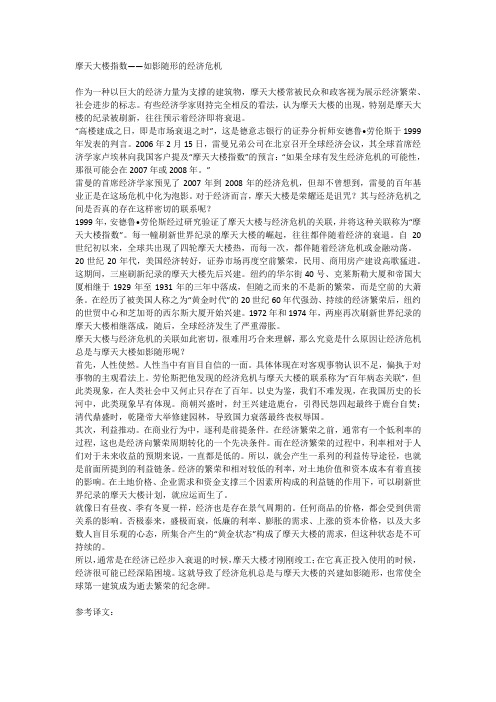
摩天大楼指数——如影随形的经济危机作为一种以巨大的经济力量为支撑的建筑物,摩天大楼常被民众和政客视为展示经济繁荣、社会进步的标志。
有些经济学家则持完全相反的看法,认为摩天大楼的出现,特别是摩天大楼的纪录被刷新,往往预示着经济即将衰退。
“高楼建成之日,即是市场衰退之时”,这是德意志银行的证券分析师安德鲁•劳伦斯于1999年发表的判言。
2006年2月15日,雷曼兄弟公司在北京召开全球经济会议,其全球首席经济学家卢埃林向我国客户提及“摩天大楼指数”的预言:“如果全球有发生经济危机的可能性,那很可能会在2007年或2008年。
”雷曼的首席经济学家预见了2007年到2008年的经济危机,但却不曾想到,雷曼的百年基业正是在这场危机中化为泡影。
对于经济而言,摩天大楼是荣耀还是诅咒?其与经济危机之间是否真的存在这样密切的联系呢?1999年,安德鲁•劳伦斯经过研究验证了摩天大楼与经济危机的关联,并将这种关联称为“摩天大楼指数”。
每一幢刷新世界纪录的摩天大楼的崛起,往往都伴随着经济的衰退。
自20世纪初以来,全球共出现了四轮摩天大楼热,而每一次,都伴随着经济危机或金融动荡。
20世纪20年代,美国经济转好,证券市场再度空前繁荣,民用、商用房产建设高歌猛进。
这期间,三座刷新纪录的摩天大楼先后兴建。
纽约的华尔街40号、克莱斯勒大厦和帝国大厦相继于1929年至1931年的三年中落成,但随之而来的不是新的繁荣,而是空前的大萧条。
在经历了被美国人称之为“黄金时代”的20世纪60年代强劲、持续的经济繁荣后,纽约的世贸中心和芝加哥的西尔斯大厦开始兴建。
1972年和1974年,两座再次刷新世界纪录的摩天大楼相继落成,随后,全球经济发生了严重滞胀。
摩天大楼与经济危机的关联如此密切,很难用巧合来理解,那么究竟是什么原因让经济危机总是与摩天大楼如影随形呢?首先,人性使然。
人性当中有盲目自信的一面。
具体体现在对客观事物认识不足,偏执于对事物的主观看法上。
韩素音英译汉原文

Outing A.I.: Beyond the Turing TestThe idea of measuring A.I. by its ability to “pass” as a human – dramatized in countless scifi films – is actually as old as modern A.I. research itself. It is traceable at least to 1950 when the British mathematician Alan Turing published “Computing Machinery and Intelligence,” a paper in which he described what we now call the “Turing Test,” and which he referred to as the “imitation game.” There are different versions of the test, all of which are revealing as to why our approach to the culture and ethics of A.I. is what it is, for good and bad. For the most familiar version, a human interrogator asks questions of two hidden contestants, one a human and the other a computer. Turing suggests that if the interrogator usually cannot tell which is which, and if the computer can successfully pass as human, then can we not conclude, for practical purposes, that the computer is “intelligent”?More people “know” Turing’s foundational text than have actually read it. This is unfortunate because the text is marvelous, strange and surprising. Turing introduces his test as a variation on a popular parlor game in which two hidden contestants, a woman (player A) and a man (player B) try to convince a third that he or she is a woman by their written responses to leading questions. To win, one of the players must convincingly be who they really are, whereas the other must try to pass as another gender. Turing describes his own variation as one where “a computer takes the place of player A,” and so a literal reading would suggest that in his version the computer is not just pretending to be a human, but pretending to be a woman. It must pass as a she.Passing as a person comes down to what others see and interpret. Because everyone else is already willing to read others according to conventional cues (of race, sex, gender, species, etc.) the complicity between whoever (or whatever) is passing and those among which he or she or it performs is what allows passing to succeed. Whether or not an A.I. is trying to pass as a human or is merely in drag as a human is another matter. Is the ruse all just a game or, as for some people who are compelled to pass in their daily lives, an essential camouflage? Either way, “passing” may say more about the audience than about the performers.That we would wish to define the very existence of A.I. in relation to its ability to mimic how humans think that humans think will be looked back upon as a weird sort of speciesism. The legacy of that conceit helped to steer some older A.I. research down disappointingly fruitless paths, hoping to recreate human minds from available parts. It just doesn’t work that way. ContemporaryA.I. research suggests instead that the threshold by which any particular arrangement of matter can be said to be “intelligent” doesn’t have much to do with how it reflects humanness back at us. As Stuart Russell and Peter Norvig (now director of research at Google) suggest in their essential A.I. textbook, biomorphic imitation is not how we design complex technology. Airplanes don’t fly like birds fly, and we certainly don’t try to trick birds into thinking that airplanes are birds in order to test whether those planes “really” are flying machines. Why do it for A.I. then? Today’s serious A.I. research does not focus on the Turing Test as an objective criterion of success, and yet in our popular culture of A.I., the test’s anthropocentrism holds such durable conceptual importance. Like the animals who talk like teenagers in a Disney movie, other minds are conceivable mostly by way of puerile ventriloquism.Where is the real injury in this? If we want everyday A.I. to be congenial in a humane sort of way, so what? The answer is that we have much to gain from a more sincere and disenchanted relationship to synthetic intelligences, and much to lose by keeping illusions on life support. Some philosophers write about the possible ethical “rights” of A.I. as sentient entities, but that’s not my point here. Rather, the truer perspective is also the better one for us as thinking technical creatures.Musk, Gates and Hawking made headlines by speaking to the dangers that A.I. may pose. Their points are important, but I fear were largely misunderstood by many readers. Relying on efforts to program A.I. not to “harm humans” (inspired by Isaac Asimov’s “three laws” of robotics from 1942) makes sense only when an A.I. knows what humans are and what harming them might mean. There are many ways that an A.I. might harm us that have nothing to do with its malevolence toward us, and chief among these is exactly following our well-meaning instructions to an idiotic and catastrophic extreme. Instead of mechanical failure or a transgression of moral code, the A.I. may pose an existential risk because it is both powerfully intelligent and disinterested in humans. To the extent that we recognize A.I. by its anthropomorphic qualities, or presume its preoccupation with us, we are vulnerable to those eventualities.Whether or not “hard A.I.” ever appears, the harm is also in the loss of all that we prevent ourselves from discovering and understanding when we insist on protecting beliefs we know to be false. In the 1950 essay, Turing offers several rebuttals to his speculative A.I., including a striking comparison with earlier objections to Copernican astronomy. Copernican traumas that abolish the false centrality and absolute specialness of human thought and species-being are pricelessaccomplishments. They allow for human culture based on how the world actually is more than on how it appears to us from our limited vantage point. Turing referred to these as “theological objections,” but one could argue that the anthropomorphic precondition for A.I. is a“pre-Copernican” attitude as well, however secular it may appear. The advent of robust inhuman A.I. may let us achieve another disenchantment, one that should enable a more reality-based understanding of ourselves, our situation, and a fuller and more complex understanding of what “intelligence” is and is not. From there we can hopefully make our world with a greater confidence that our models are good approximations of what’s out there.。
第23届韩素音青年翻译奖竞赛译文5
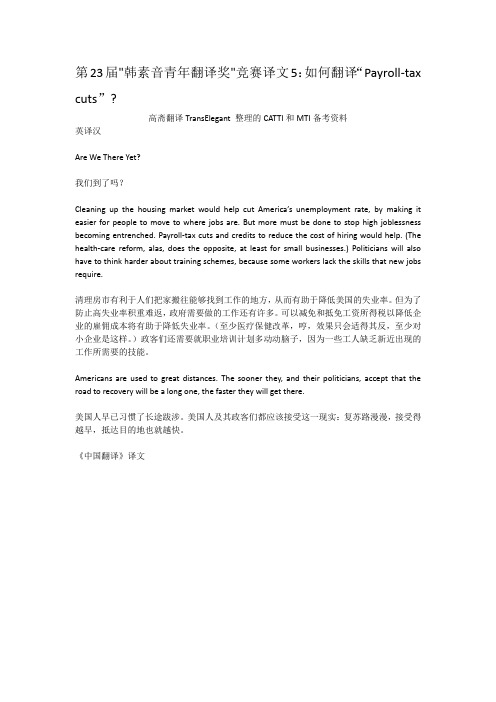
第23届"韩素音青年翻译奖"竞赛译文5:如何翻译“Payroll-tax cuts”?高斋翻译TransElegant整理的CATTI和MTI备考资料英译汉Are We There Yet?我们到了吗?Cleaning up the housing market would help cut America’s unemployment rate, by making it easier for people to move to where jobs are. But more must be done to stop high joblessness becoming entrenched. Payroll-tax cuts and credits to reduce the cost of hiring would help. (The health-care reform, alas, does the opposite, at least for small businesses.) Politicians will also have to think harder about training schemes, because some workers lack the skills that new jobs require.清理房市有利于人们把家搬往能够找到工作的地方,从而有助于降低美国的失业率。
但为了防止高失业率积重难返,政府需要做的工作还有许多。
可以减免和抵免工资所得税以降低企业的雇佣成本将有助于降低失业率。
(至少医疗保健改革,哼,效果只会适得其反,至少对小企业是这样。
)政客们还需要就职业培训计划多动动脑子,因为一些工人缺乏新近出现的工作所需要的技能。
Americans are used to great distances. The sooner they, and their politicians, accept that the road to recovery will be a long one, the faster they will get there.美国人早已习惯了长途跋涉。
韩素音英语竞赛24-27届原文
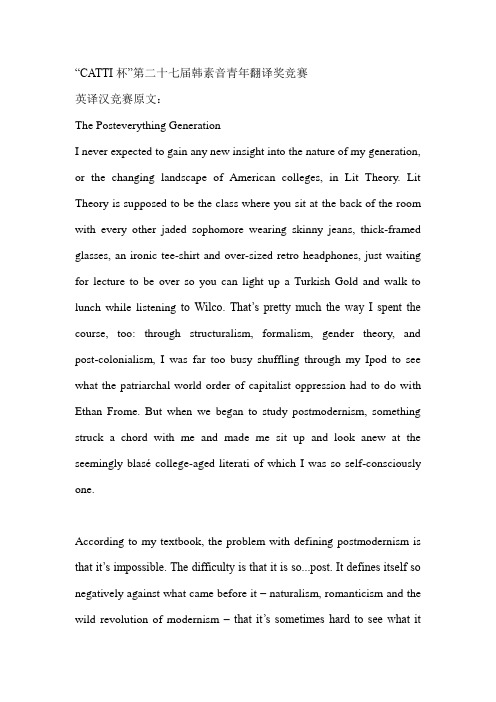
―CATTI杯‖第二十七届韩素音青年翻译奖竞赛英译汉竞赛原文:The Posteverything GenerationI never expected to gain any new insight into the nature of my generation, or the changing landscape of American colleges, in Lit Theory. Lit Theory is supposed to be the class where you sit at the back of the room with every other jaded sophomore wearing skinny jeans, thick-framed glasses, an ironic tee-shirt and over-sized retro headphones, just waiting for lecture to be over so you can light up a Turkish Gold and walk to lunch while listening to Wilco. That‘s pretty much the way I spent the course, too: through structuralism, formalism, gender theory, and post-colonialism, I was far too busy shuffling through my Ipod to see what the patriarchal world order of capitalist oppression had to do with Ethan Frome. But when we began to study postmodernism, something struck a chord with me and made me sit up and look anew at the seemingly blasé college-aged literati of which I was so self-consciously one.According to my textbook, the problem with defining postmodernism is that it‘s impossible. The difficulty is that it is so...post. It defines itself so negatively against what came before it – naturalism, romanticism and the wild revolution of modernism –that it‘s sometimes hard to see what itactually is. It denies that anything can be explained neatly or even at all. It is parodic, detached, strange, and sometimes menacing to traditionalists who do not understand it. Although it arose in the post-war west (the term was coined in 1949), the generation that has witnessed its ascendance has yet to come up with an explanation of what postmodern attitudes mean for the future of culture or society. The subject intrigued me because, in a class otherwise consumed by dead-letter theories, postmodernism remained an open book, tempting to the young and curious. But it also intrigued me because the question of what postmodernism –what a movement so post-everything, so reticent to define itself – is spoke to a larger question about the political and popular culture of today, of the other jaded sophomores sitting around me who had grown up in a postmodern world.In many ways, as a college-aged generation, we are also extremely post: post-Cold War, post-industrial, post-baby boom, post-9/11...at one point in his fa mous essay, ―Postmodernism, or the Cultural Logic of Late Capitalism,‖ literary critic Frederic Jameson even calls us ―post-literate.‖ We are a generation that is riding on the tail-end of a century of war and revolution that toppled civilizations, overturned repressive social orders, and left us with more privilege and opportunity than any other society in history. Ours could be an era to accomplish anything.And yet do we take to the streets and the airwaves and say ―here we are, and this is what we dema nd‖? Do we plant our flag of youthful rebellion on the mall in Washington and say ―we are not leaving until we see change! Our eyes have been opened by our education and our conception of what is possible has been expanded by our privilege and we demand a better world because it is our right‖? It would seem we do the opposite. We go to war without so much as questioning the rationale, we sign away our civil liberties, we say nothing when the Supreme Court uses Brown v. Board of Education to outlaw segregation, and we sit back to watch the carnage on the evening news.On campus, we sign petitions, join organizations, put our names on mailing lists, make small-money contributions, volunteer a spare hour to tutor, and sport an entire wardrobe‘s worth of Live S trong bracelets advertising our moderately priced opposition to everything from breast cancer to global warming. But what do we really stand for? Like a true postmodern generation we refuse to weave together an overarching narrative to our own political consciousness, to present a cast of inspirational or revolutionary characters on our public stage, or to define a specific philosophy. We are a story seemingly without direction or theme, structure or meaning –a generation defined negatively againstwhat ca me before us. When Al Gore once said ―It‘s the combination of narcissism and nihilism that really defines postmodernism,‖ he might as well have been echoing his entire generation‘s critique of our own. We are a generation for whom even revolution seems trite, and therefore as fair a target for blind imitation as anything else. We are the generation of the Che Geuvera tee-shirt.Jameson calls it ―Pastiche‖ –―the wearing of a linguistic mask, speech in a dead language.‖ In literature, this means an author s peaking in a style that is not his own – borrowing a voice and continuing to use it until the words lose all meaning and the chaos that is real life sets in. It is an imitation of an imitation, something that has been re-envisioned so many times the original model is no longer relevant or recognizable. It is mass-produced individualism, anticipated revolution. It is why postmodernism lacks cohesion, why it seems to lack purpose or direction. For us, the post-everything generation, pastiche is the use and reuse of the old clichés of social change and moral outrage – a perfunctory rebelliousness that has culminated in the age of rapidly multiplying non-profits and relief funds. We live our lives in masks and speak our minds in a dead language – the language of a society that expects us to agitate because that‘s what young people do. But how do we rebel against a generation that is expecting, anticipating, nostalgic for revolution?How do we rebel against parents that sometimes seem to want revolution more than we do? We don‘t. We rebel by not rebelling. We wear the defunct masks of protest and moral outrage, but the real energy in campus activism is on the internet, with websites like . It is in the rapidly developing ability to communicate ideas and frustration in chatrooms instead of on the streets, and channel them into nationwide projects striving earnestly for moderate and peaceful change: we are the generation of Students Taking Action Now Darfur; we are the Rock the V ote generation; the generation of letter-writing campaigns and public interest lobbies; the alternative energy generation.College as America once knew it –as an incubator of radical social change –is coming to an end. To our generation the word ―radicalism‖ evokes images of al Qa eda, not the Weathermen. ―Campus takeover‖ sounds more like Virginia Tech in 2007 than Columbia University in 1968. Such phrases are a dead language to us. They are vocabulary from another era that does not reflect the realities of today. However, the technological revolution, the revolution, the revolution of the organization kid, is just as real and just as profound as the revolution of the 1960‘s – it is just not as visible. It is a work in progress, but it is there. Perhaps when our parents finally stop pointing out the things that we arenot, the stories that we do not write, they will see the threads of our narrative begin to come together; they will see that behind our pastiche, the post generation speaks in a language that does make sense. We are writing a revolution. We are just putting it in our own words.汉译英竞赛原文:保护古村落就是保护―根性文化‖传统村落是指拥有物质形态和非物质形态文化遗产,具有较高的历史、文化、科学、艺术、社会、经济价值的村落。
第23届韩素音青年翻译奖竞赛汉译英原文
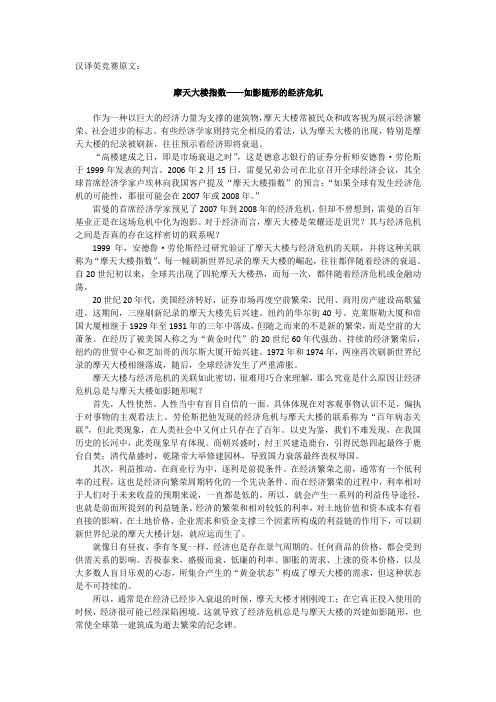
汉译英竞赛原文:摩天大楼指数——如影随形的经济危机作为一种以巨大的经济力量为支撑的建筑物,摩天大楼常被民众和政客视为展示经济繁荣、社会进步的标志。
有些经济学家则持完全相反的看法,认为摩天大楼的出现,特别是摩天大楼的纪录被刷新,往往预示着经济即将衰退。
“高楼建成之日,即是市场衰退之时”,这是德意志银行的证券分析师安德鲁·劳伦斯于1999年发表的判言。
2006年2月15日,雷曼兄弟公司在北京召开全球经济会议,其全球首席经济学家卢埃林向我国客户提及“摩天大楼指数”的预言:“如果全球有发生经济危机的可能性,那很可能会在2007年或2008年。
”雷曼的首席经济学家预见了2007年到2008年的经济危机,但却不曾想到,雷曼的百年基业正是在这场危机中化为泡影。
对于经济而言,摩天大楼是荣耀还是诅咒?其与经济危机之间是否真的存在这样密切的联系呢?1999年,安德鲁·劳伦斯经过研究验证了摩天大楼与经济危机的关联,并将这种关联称为“摩天大楼指数”。
每一幢刷新世界纪录的摩天大楼的崛起,往往都伴随着经济的衰退。
自20世纪初以来,全球共出现了四轮摩天大楼热,而每一次,都伴随着经济危机或金融动荡。
20世纪20年代,美国经济转好,证券市场再度空前繁荣,民用、商用房产建设高歌猛进。
这期间,三座刷新纪录的摩天大楼先后兴建。
纽约的华尔街40号、克莱斯勒大厦和帝国大厦相继于1929年至1931年的三年中落成,但随之而来的不是新的繁荣,而是空前的大萧条。
在经历了被美国人称之为“黄金时代”的20世纪60年代强劲、持续的经济繁荣后,纽约的世贸中心和芝加哥的西尔斯大厦开始兴建。
1972年和1974年,两座再次刷新世界纪录的摩天大楼相继落成,随后,全球经济发生了严重滞胀。
摩天大楼与经济危机的关联如此密切,很难用巧合来理解,那么究竟是什么原因让经济危机总是与摩天大楼如影随形呢?首先,人性使然。
人性当中有盲目自信的一面。
具体体现在对客观事物认识不足,偏执于对事物的主观看法上。
历届韩素音翻译大奖赛竞赛原文及译文
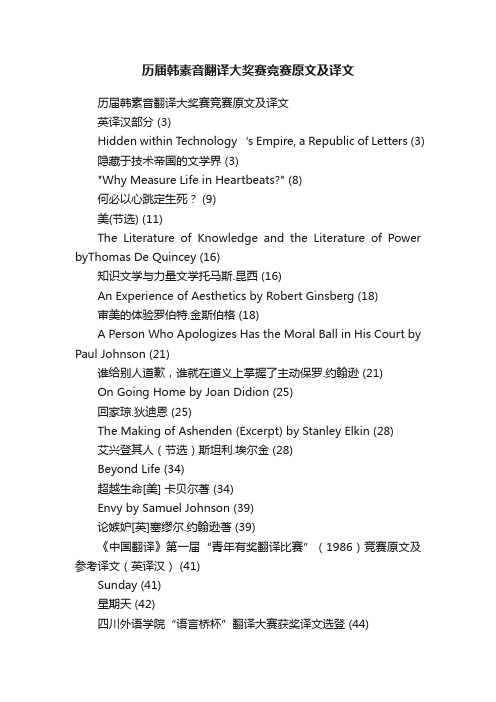
历届韩素音翻译大奖赛竞赛原文及译文历届韩素音翻译大奖赛竞赛原文及译文英译汉部分 (3)Hidden within Technology‘s Empire, a Republic of Letters (3)隐藏于技术帝国的文学界 (3)"Why Measure Life in Heartbeats?" (8)何必以心跳定生死? (9)美(节选) (11)The Literature of Knowledge and the Literature of Power byThomas De Quincey (16)知识文学与力量文学托马斯.昆西 (16)An Experience of Aesthetics by Robert Ginsberg (18)审美的体验罗伯特.金斯伯格 (18)A Person Who Apologizes Has the Moral Ball in His Court by Paul Johnson (21)谁给别人道歉,谁就在道义上掌握了主动保罗.约翰逊 (21)On Going Home by Joan Didion (25)回家琼.狄迪恩 (25)The Making of Ashenden (Excerpt) by Stanley Elkin (28)艾兴登其人(节选)斯坦利.埃尔金 (28)Beyond Life (34)超越生命[美] 卡贝尔著 (34)Envy by Samuel Johnson (39)论嫉妒[英]塞缪尔.约翰逊著 (39)《中国翻译》第一届“青年有奖翻译比赛”(1986)竞赛原文及参考译文(英译汉) (41)Sunday (41)星期天 (42)四川外语学院“语言桥杯”翻译大赛获奖译文选登 (44)第七届“语言桥杯”翻译大赛获奖译文选登 (44)The Woods: A Meditation (Excerpt) (46)林间心语(节选) (47)第六届“语言桥杯”翻译大赛获奖译文选登 (50)第五届“语言桥杯”翻译大赛原文及获奖译文选登 (52)第四届“语言桥杯”翻译大赛原文、参考译文及获奖译文选登 (54) When the Sun Stood Still (54)永恒夏日 (55)CASIO杯翻译竞赛原文及参考译文 (56)第三届竞赛原文及参考译文 (56)Here Is New York (excerpt) (56)这儿是纽约 (58)第四届翻译竞赛原文及参考译文 (61)Reservoir Frogs (Or Places Called Mama's) (61)水库青蛙(又题:妈妈餐馆) (62)中译英部分 (66)蜗居在巷陌的寻常幸福 (66)Simple Happiness of Dwelling in the Back Streets (66)在义与利之外 (69)Beyond Righteousness and Interests (69)读书苦乐杨绛 (72)The Bitter-Sweetness of Reading Yang Jiang (72)想起清华种种王佐良 (74)Reminiscences of Tsinghua Wang Zuoliang (74)歌德之人生启示宗白华 (76)What Goethe's Life Reveals by Zong Baihua (76)怀想那片青草地赵红波 (79)Yearning for That Piece of Green Meadow by Zhao Hongbo (79)可爱的南京 (82)Nanjing the Beloved City (82)霞冰心 (84)The Rosy Cloud byBingxin (84)黎明前的北平 (85)Predawn Peiping (85)老来乐金克木 (86)Delights in Growing Old by Jin Kemu (86)可贵的“他人意识” (89)Calling for an Awareness of Others (89)教孩子相信 (92)To Implant In Our Children‘s Young Hearts An Undying Faith In Humanity (92)心中有爱 (94)Love in Heart (94)英译汉部分Hidden within Technology’s Empire, a Republic of Le tters 隐藏于技术帝国的文学界索尔·贝娄(1)When I was a boy ―discovering literature‖, I used to think how wonderful it would be if every other person on the street were familiar with Proust and Joyce or T. E. Lawrence or Pasternak and Kafka. Later I learned how refractory to high culture the democratic masses were. Lincoln as a young frontiersman read Plutarch, Shakespeare and the Bible. But then he was Lincoln.我还是个“探索文学”的少年时,就经常在想:要是大街上人人都熟悉普鲁斯特和乔伊斯,熟悉T.E.劳伦斯,熟悉帕斯捷尔纳克和卡夫卡,该有多好啊!后来才知道,平民百姓对高雅文化有多排斥。
- 1、下载文档前请自行甄别文档内容的完整性,平台不提供额外的编辑、内容补充、找答案等附加服务。
- 2、"仅部分预览"的文档,不可在线预览部分如存在完整性等问题,可反馈申请退款(可完整预览的文档不适用该条件!)。
- 3、如文档侵犯您的权益,请联系客服反馈,我们会尽快为您处理(人工客服工作时间:9:00-18:30)。
Are We There Yet?America’s recovery will be much slower than that from most recessions; but the government can help a bit.“WHITHER goest thou, America?” That question, posed by Jack Kerouac on behalf of the Beat generation half a century ago, is the biggest uncertainty hanging over the world economy. And it reflects the foremost worry for American voters, who go to the polls for the congressional mid-term elections on November 2nd with the country’s unemployment rate stubbornly stuck at nearly one in ten. They should prepare themselves for a long, hard ride.The most wrenching recession since the 1930s ended a year ago. But the recovery—none too powerful to begin with—slowed sharply earlier this year. GDP grew by a feeble 1.6% at an annual pace in the second quarter, and seems to have been stuck somewhere similar since. The housing market slumped after temporary tax incentives to buy a home expired. So few private jobs were being created that unemployment looked more likely to rise than fall. Fears grew over the summer that if this deceleration continued, America’s economy would slip back into recession.Fortunately, those worries now seem exaggerated. Part of the weakness ofsecond-quarter GDP was probably because of a temporary surge in imports from China. The latest statistics, from reasonably good retail sales in August to falling claims for unemployment benefits, point to an economy that, though still weak, is not slumping further. And history suggests that although nascent recoveries often wobble for a quarter or two, they rarely relapse into recession. For now, it is most likely that America’s economy will crawl along with growth at perhaps 2.5%: above stall speed, but far too slow to make much difference to the jobless rate.Why, given that America usually rebounds from recession, are the prospects so bleak? That’s because most past recessions have been caused by tight monetary policy. When policy is loosened, demand rebounds. This recession was the result of a financial crisis. Recoveries after financial crises are normally weak and slow as banking systems are repaired and balance-sheets rebuilt. Typically, this period of debt reduction lasts around seven years, which means America would emerge from it in 2014. By some measures, households are reducing their debt burdens unusually fast, but even optimistic seers do not think the process is much more than half over.Battling on the busAmerica’s biggest problem is that its politicians have yet to acknowledge that the economy is in for such a long, slow haul, let alone prepare for the consequences. A few brave officials are beginning to sound warnings that the jobless rate is likely to “stay high”. But the political debate is more about assigning blame for the recession than about suggesting imaginative ways to give more oomph to the recovery.Republicans argue that Barack Obama’s shift towards “big government” explains the economy’s weakness, and that high unemployment is proof that fiscal stimulus was a bad idea. In fact, most of the growth in government to date has been temporary and unavoidable; the longer-run growth in government is more modest, and reflects the policies of both Mr Obama and his predecessor. And the notion that high joblessness “proves” that stimulus failed is simply wrong. The mechan ics of a financial bust suggest that without a fiscal boost the recession would have been much worse.Democrats have their own class-warfare version of the blame game, in which Wall Street’s excesses caused the problem and higher taxes on high-earners are part of the solution. That is why Mr. Obama’s legislative priority before the mid-terms is to ensure that the Bush tax cuts expire at the end of this year for households earning more than $250,000 but are extended for everyone else.This takes an unnecessary risk with the short-term recovery. America’s experience in 1937 and Japan’s in 1997 are powerful evidence that ill-timed tax rises can tip weak economies back into recession. Higher taxes at the top, along with the waning of fiscal stimulus and belt-tightening by the states, will make a weak growth rate weaker still. Less noticed is that Mr. Obama’s fiscal plan will also worsen the medium-term budget mess, by making tax cuts for the middle class permanent.Ways to overhaul the engineIn an ideal world America would commit itself now to the medium-term tax reforms and spending cuts needed to get a grip on the budget, while leav ing room to keep fiscal policy loose for the moment. But in febrile, partisan Washington that is a pipe-dream. Today’s goals can only be more modest: to nurture the weak economy, minimize uncertainty and prepare the ground for tomorrow’s fiscal debate. To that end, Congress ought to extend all the Bush tax cuts until 2013. Then they should all expire—prompting a serious fiscal overhaul, at a time when the economy is stronger.A broader set of policies could help to work off the hangover faster. One priority is to encourage more write-downs of mortgage debt. Almost a quarter of all Americans with mortgages owe more than their houses are worth. Until that changes the vicious cycle of rising foreclosures and falling prices will continue. There are plenty of ideas on offer, from changing the bankruptcy law so that judges can restructure mortgage debt to empowering special trustees to write down loans. They all have drawbacks, but a fetid pool of underwater mortgages will, much like Japan’s loans to zombie firms, corrode the financial system and harm the recovery.Cleaning up the housing market would help cut America’s unemployment rate, by making it easier for people to move to where jobs are. But more must be done to stop high joblessness becoming entrenched. Payroll-tax cuts and credits to reduce the cost of hiring would help. (The health-care reform, alas, does the opposite, at least for small businesses.)Politicians will also have to think harder about training schemes, because some workers lack the skills that new jobs require.Americans are used to great distances. The sooner they, and their politicians, accept that the road to recovery will be a long one, the faster they will get there.。
